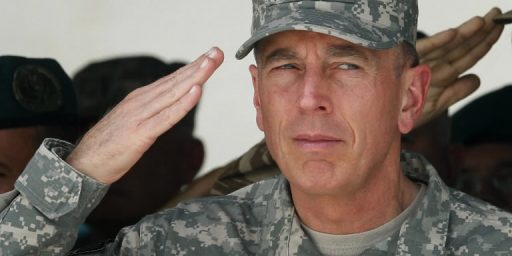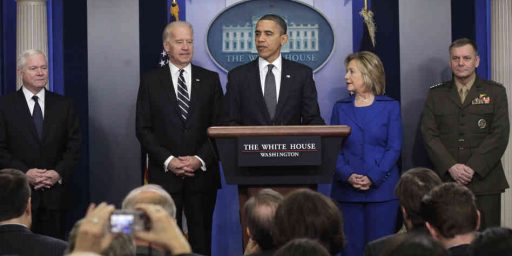Gates Pauses Surge Drawdown
Defense Secretary Robert Gates says the post-Surge drawdown may have to wait.
Defense Secretary Robert Gates on Monday endorsed, for the first time, the idea of pausing the drawdown of U.S. forces from Iraq this summer. “A brief period of consolidation and evaluation probably does make sense,” Gates told reporters after meeting with Gen. David Petraeus, the top U.S. commander in Iraq. Petraeus has indicated in recent weeks that he wants a “period of evaluation” this summer to assess the impact on Iraq security of reducing the U.S. military presence from 20 brigades to 15 brigades. Of that five-brigade reduction, only one has departed thus far. The last of the five is to be gone by the end of July.
In his remarks at this U.S. base in southern Baghdad, Gates said Petraeus had given him his view on the drawdown, which some fear could result in giving up some of the security gains of recent months.
In endorsing Petraeus’ suggestion of pausing after July, Gates made it clear that President Bush would have the final say. Until now it had been unclear how Gates felt about the idea of a pause; he had said publicly a number of times that he hoped conditions in Iraq would permit a continuation of the drawdown in the second half of the year. In his remarks here, Gates indicated that he had begun some time ago to lean in Petraeus’ direction. “In my own thinking I had been kind of headed in that direction as well,” Gates said. “But one of the keys is how long is that period (of pause and evaluation) and then what happens after that.”
Although Petraeus and other senior commanders in Iraq had been suggesting the possibility of a pause in the drawdown, the idea runs counter to those in the military — particularly in the Army and Marine Corps — who worry that strains on troops from long and multiple combat tours will grow worse unless the drawdown continues after July.
[…]
On Sunday, Gates said Iraq’s political leaders face hard choices on how to stabilize the country despite promising new signs of progress toward reconciliation. “They seem to have become energized over the last few weeks,” Gates said. The Pentagon chief told reporters who traveled with him from a conference in Germany that he wants to “see what the prospects are for further success in the next couple of months.”
[…]
The question is whether conditions in Baghdad and elsewhere have improved enough to permit even more troop cuts without risking a deterioration in security. Petraeus’ strategy is based on an expectation that improved security over time will give Iraqi political leaders an impetus to make compromises on legislation and other moves toward reconciliation.
Most observers seem to agree that the Surge has been a primary factor in improving the security situation in Iraq. Still, the theory behind adding more troops was that it would give Iraq’s civilian leaders some “breathing room” to resolve political differences. There’s not much progress on that front.
The Surge was always intended to be very short-lived, simply because our military leaders believe we can’t sustain the OPSTEMPO. While cries of “broken Army” have always struck me as hyperbolic, there’s not much question that fighting two wars over such a sustained period has put considerable strain on the force — especially since most of the burden falls on the fraction of those in uniform with the right skill sets. Given that little or nothing has been done to change the underlying force structure, it’s not clear to me that we can simply sustain these troop levels indefinitely.






I suppose that’s true, but merely bringing levels of violence back down to 2005 levels still isn’t really THAT much of an improvement.
That’s the conundrum that the leaders of our two political parties find themselves in. It’s very obvious that we can have a positive influence on security in Iraq as long as we stay there. In that Republicans are right. The American people don’t want to stay there. In that Democrats are right.
Using our departure as leverage to impel the Iraqi factions to arrive at some political solution to their problems is something like the threat made by Cleavon Little (Bart) in Blazing Saddles—the Iraqis would have to be really, really stupid to take it seriously.
Thank you! That’s what I’ve been saying for a while now. 500 civilians killed per month is better than 1500, but it’s still 500 a month.
For those arguing it is not a quagmire – can you agree it is NOW one? Or are we really going to act like there is real progress?
500 deaths per month would be about what Brazil is currently experiencing. Is that a quagmire? Dropping the death rate is a huge improvement but its only part of the story. Much of the story is the sense of security across areas where the surge has taken place. The economy improves and population’s life improves because the improved security allows for improving services such as electricity, garbage collection, or water.
That said Bush would be wise to direct that US pause at 14 and not 15 Brigades. It signals the Iraqis that the commitment by US will go down. Staying at 15 Brigades allows Iraqis to continue belief we’ll just remain there as is.
in a population 8 times that of Iraq. The example is wholly specious.
We shouldn’t sugarcoat the situation. No matter how you cut it 500 per month is a lot of violent death.
That’s not the question. The question is will the violence be abated more effectively by our staying in Iraq or leaving it? I believe that reasonable people can differ in their answers to that question. It’s a matter of judgment, conjecture, and opinion.
There are other questions too, like what it will cost us to try and stay, the effect on neighboring regions, and so forth.
Agreed. And what the costs will be if we don’t.